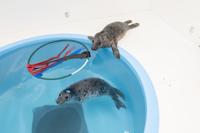DELMARVA - The National Aquarium Animal Rescue team are working through their busiest local seal rescue season in years, with four juvenile seals currently in their care.
Rescuers say they have received near-constant reports of harp and grey seal sightings on Delmarva’s beaches recently. According to the National Aquarium, four seal pups rescued locally are currently being rehabilitated at the National Aquarium Animal Care and Rescue Center in Baltimore.
Three of the young seals were transported from the Aquarium’s triage center in Ocean City, while the fourth was brought directly from the beach. With four seal pups in rehab suites at the same time, rescuers say the space is at capacity.
The National Aquarium says the four pups are all at an age when they are particularly vulnerable to malnutrition, dehydration, other animals, and infections. Rescuers will focus on teaching the young marine mammals how to forage for food independently while they recover.
Two of the rescues are young male grey seals, Woodberry and Evergreen, both rescued from Sussex County beaches. While Woodberry is showing promising improvement from infected puncture wounds and malnourishment, rescuers say Evergreen is receiving antibiotics and pain medication for what appears to be wounds from a shark encounter.
Waverly, a female grey seal, was found in Dewey Beach on March 10 and is now eating independently. Arcadia, a second young female gray seal, was found emaciated and wounded in Ocean City and is not yet considered stable.
The National Aquarium says they also responded to an older harp seal that later passed as well as a younger female grey seal that passed after being found entangled in a fishing net on Assateague Island. A dolphin found near 40th Street in Ocean City also did not survive long enough to receive treatment.
The National Aquarium says the spike in seal rescue activity is due to the natural establishment of a colony of harbor and grey seals off the coast of Cape Henlopen. Those rescue efforts, the Aquarium says, are funded in part by private philanthropy as well as coordination from NOAA’s John H. Prescott Marine Mammal Rescue Assistance Grant Program. Funding for that NOAA grant program is vital for continued research and rescues, according to the National Aquarium.


